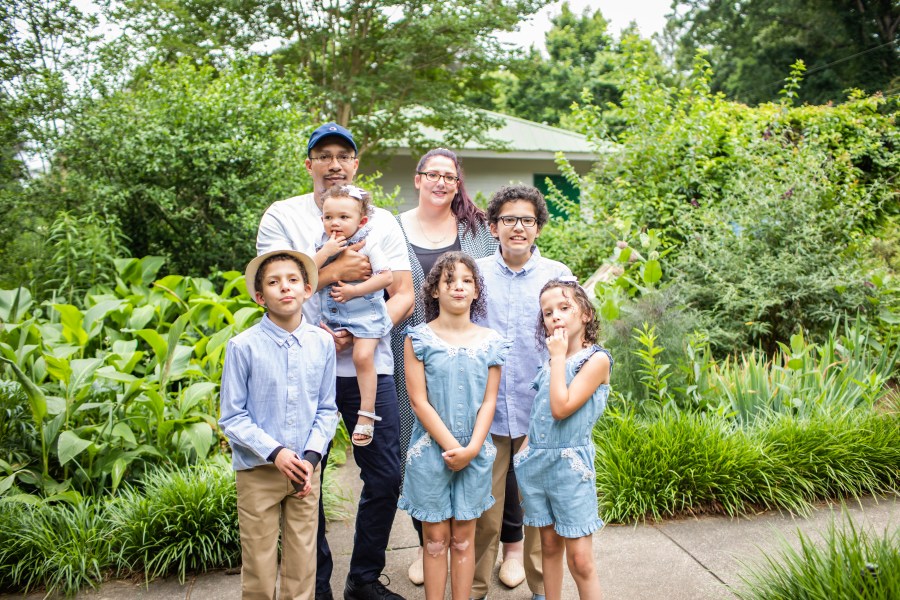Preventing evictions to stop ‘invisible’ family homelessness

Kylie and David received rental assistance from Family Promise so they could remain in their apartment after health issues kept David from working and they were temporarily unable to pay rent. Courtesy of Family Promise
(NewsNation) — The ledge between housed and unhoused has become increasingly precarious for many American families.
Nationwide, more than 8 million households report not being caught up on rent payments, and almost 4 million said they were very or somewhat likely to be evicted in the next two months, according to the most recent census data.
To keep families in their homes, a national group called Family Promise is helping renters negotiate with their landlords to keep them off the streets and out of court, sometimes even taking on the financial risk and covering payments.
“Past approaches of other organizations have often been, someone shows up at a homeless shelter, they’re getting a bed for the night, they’re getting the meal … and then they’re kind of in and out (of the shelter system),” said Cara Bradshaw, chief impact officer of Family Promise.
Nationally, the nonprofit says it helped more than 680 families — including 1,500 children — avoid losing their homes in 2021. They estimate they’ll prevent 1,000 families from being unhoused in 2022.
“The gap between the cost of housing and their family’s income is more than it’s ever been,” said T.J. Putman, executive director of a local Family Promise chapter in Oregon. “If we want to live in a world where kids aren’t homeless, we need to be sure that those basic pieces are taken care of.”
The ‘invisible’ homeless
One of the first times landlord Dave Noe entered into mediation with a tenant was over unpaid utility bills.
“It’s assessed to my taxes, so I end up paying it, right?” said Noe, who owns five units in the Minneapolis-St. Paul area.
Through Family Promise, he found a local organization that helped the tenant find a solution to keep the water on — and the bill paid.
“They were able to help with a water bill, and then I took the last month’s rent (deposit) in lieu of what they were behind,” Noe said, who later joined Family Promise’s board. “If you’re not getting paid, the knee-jerk reaction is, ‘I’m going to County and file eviction.’ Family Promises does a nice job of like, ‘OK, here are the resources that are available to you that as a landlord you likely don’t know about.”
That includes assigning a case manager to help a family get back on track financially, providing rent or utility assistance, or helping a tenant transition into cheaper housing while avoiding an eviction, according to Family Promise’s 2021 report.
Almost half of American households now pay more than 30% of their income for housing. That puts families at risk of becoming a part of the “invisible homeless” population — people who bounce from hotels to friends’ couches to living in a car.
These families experience a higher risk of violence and children encounter a higher rate of learning loss, among other issues including increased illness, hunger and developmental delays.

Key to the program’s success is building relationships with local landlords before their tenants are in crisis, Putman said. In Oregon, that includes surveying landlords to assess what services would help them collaborate with their tenants during a crisis.
“We live in a different world than we lived in two years ago,” Noe said, adding that a financial setback like a car breaking down, a sudden illness or losing a job is more likely to lead to an eviction today. “What we find is that the best intervention for families facing homelessness is immediate, one-time assistance — that if we can jump in, we can get them stable.”
Mediators are not allowed to issue legal advice or force a resolution but can help tenants feel comfortable enough to share struggles, a 2020 Urban Institute study found. That’s important for renters, as landlords are significantly more likely to have a lawyer.
The alternative is entering the drawn-out and pricey eviction court system, which Noe says pits tenants and landlords against each other. It can also be damaging for both the tenant and landlord’s reputation.
“Just having the filing on your record is going to be potentially disqualifying and lock you out from finding safe housing,” said Peter Hepburn, a researcher with The Eviction Lab.
Still, many tenants and landlords do not know mediation is an option, the Urban Institute study found, although federal eviction relief dollars during the pandemic helped raise awareness.
Many states required a mediation process before landlords received back rent. Early data indicates this may have kept more people in their homes.
According to The Eviction Lab, many states and cities are still below pre-pandemic eviction levels — although that could change as the last of the state moratoriums expired this summer.
“We don’t want to make kids veterans of homelessness,” Putman said. “We want to have it (be) just a one time thing.”










